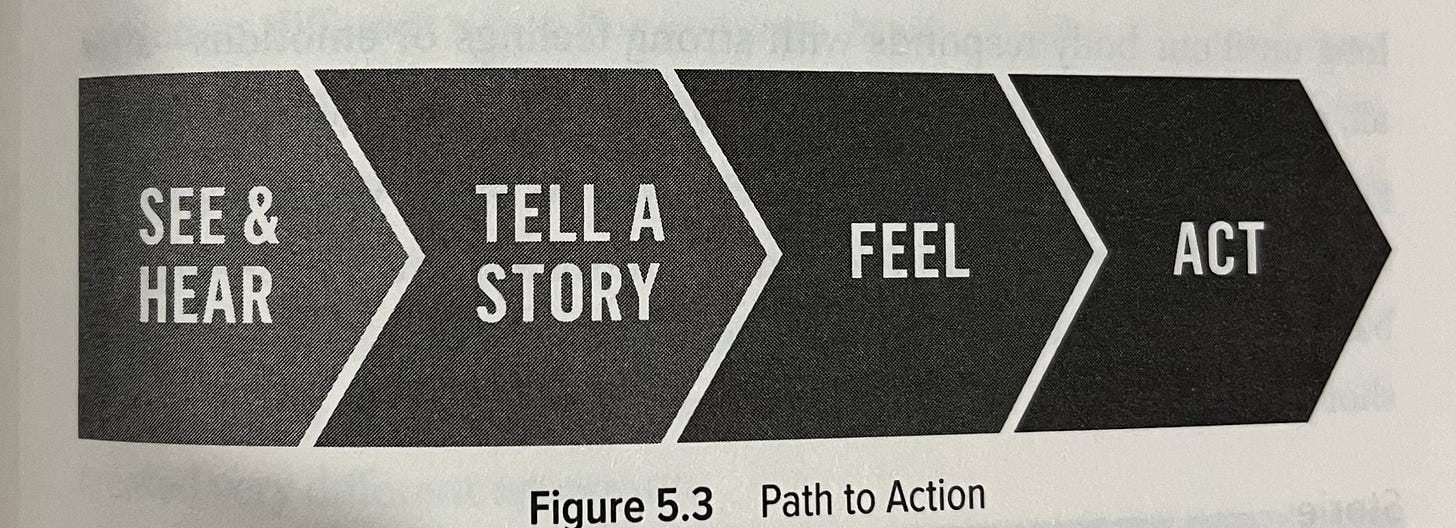The Stories We Tell Ourselves
Nothing in this world is good or bad but thinking makes it so
“It's the world we live in, sadly. No respect, no consideration. Hardly anyone cares anymore.”
“My guess is the person could probably use the steps from a spot much further out.”
These were some comments I read on a social media post recently. A person was being called out for parking in a law enforcement spot at a local grocery store. I am a recovering rule follower, so my initial reaction after reading this post was to be annoyed.
But what if my reaction says more about me than the alleged perpetrator?
We tell ourselves stories based on our experiences and the information we consume. These stories then naturally translate into snap judgments we make about others. It happens in an instant. If, for instance, you believe no one respects law enforcement, you could assume this person was thumbing their nose at the police. Or perhaps you think they had to be out of shape and were looking for a shorter walk to the door. Our stories will determine how we see the world regardless of what is true. As William Shakespeare said,
“Nothing in this world is good or bad but thinking makes it so.”
Stories provide the rationale for interpreting what we see. In an excellent book I read called “Crucial Conversations”1, the authors say,
“Our stories contain not just conclusions but also judgments (whether something is good or bad) and attributions (interpretation of others' motives).”
This is a powerful concept. We see and hear something, which creates an internal story that drives our emotions and feelings, leading to actions. This is illustrated in the following diagram from the book:2
Any set of facts can be used to tell many stories. Let’s go back to the rogue car parker. Instead of assuming the worst, let’s ask some different questions:
Was she an off-duty officer?
Did she recently lose her spouse, who was a law enforcement officer, and did she feel she had a right to park there?
Did she have poor health, and all the handicapped spots were filled?
Did she have a challenging family situation and was oblivious to where she was parking?
As the authors say, “If we take control of our stories, they won’t control us.” This concept can foster better stories and relationships with our families, friends, and strangers.
I used this concept recently in a work situation. I knew something was happening with a coworker, even though they would say everything was fine when I asked. After a few failed attempts, I said, “Hey Marty, the story I’m telling myself when we talked about this issue is that I let you down by not providing the right support. What did I get right, and what did I get completely wrong in what I just said?” This opened the door to a candid conversation about what was really going on, helped us make real progress on solving the problem, and had the added benefit of improving our relationship.
I’ll close by returning to our friend, the rogue car parker. Perhaps she really was insensitive and was prioritizing her own comfort. It will remain one of life’s big mysteries because no one spoke with her, or if they did, it didn’t make it into the comments.
My encouragement to you is:
Read Crucial Conversations. It is an engaging read with practical methods to positively impact your most important relationships.
Get curious instead of judgmental. Regardless of what our brain tells us, we don’t know the whole story.
Assume positive intent. Each one of us is fighting a battle others know nothing about.
May your instinct be to question the stories you tell yourself. With so much turmoil going on in our world, what if we each decided we would make a difference for those around us by telling ourselves different stories? Make it a fantastic week!
If you’d like to listen to me read this post, click here!
We now have 200 subscribers! Thank you! If this post resonated with you, please hit the ❤️ button so more people will see it.
Crucial Conversations p. 79





This is uncanny Tarek! First when I saw this title I thought you commented on my post from 3 weeks ago, by the same title!!! May I share it with you here? https://open.substack.com/pub/imolazsitva/p/the-stories-we-tell-ourselves-in?r=2q4qf4&utm_medium=ios&utm_campaign=post
So I clearly share your sentiments! The stories we tell ourselves is how we interpret the world. So glad to have read this!
I am currently working on breaking the thought loop of “What I think, I see. What I see, I experience. What I experience, I think.”